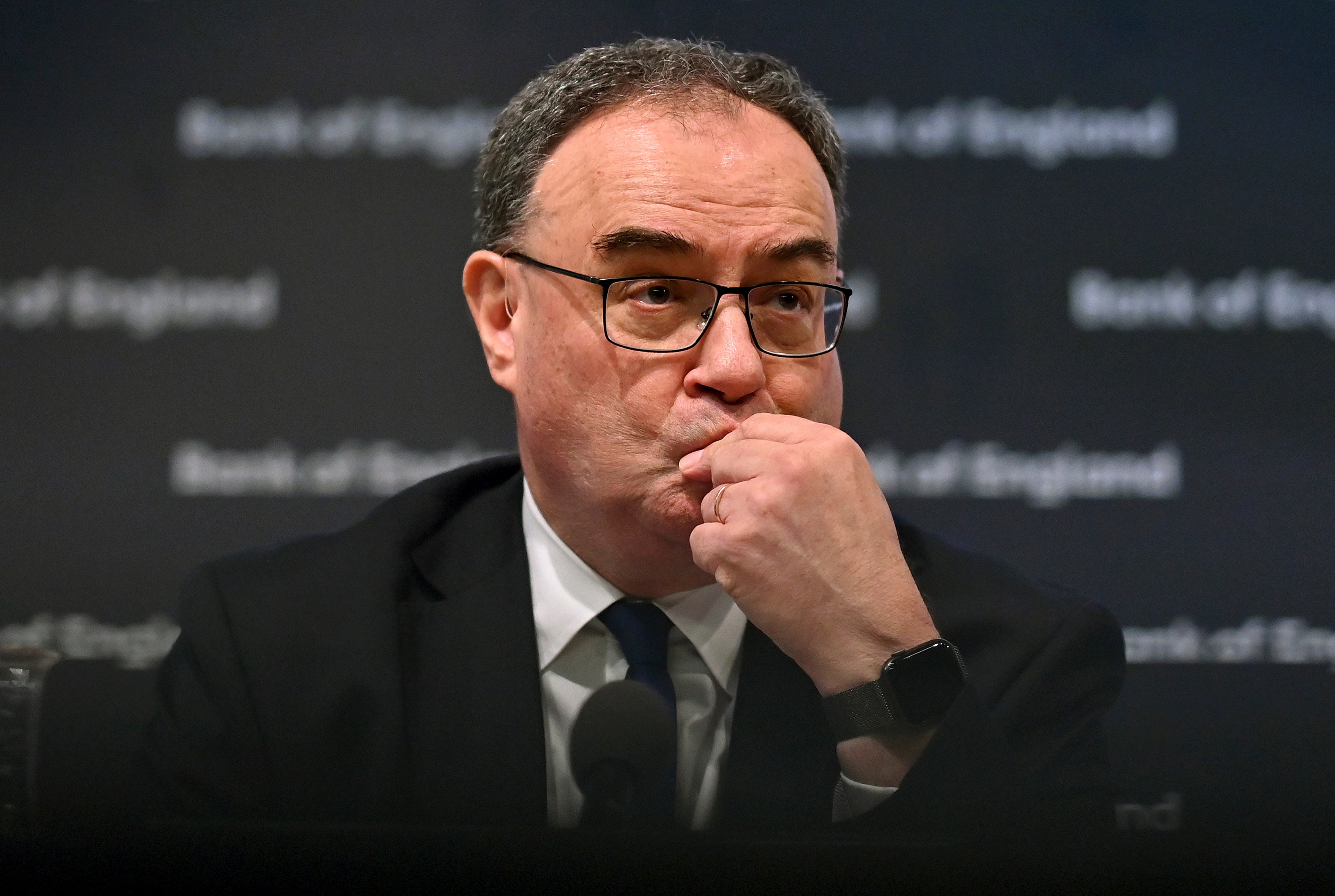
Bank of England governor Andrew Bailey is keen to get inflation down to his 2% target
(AFP or licensor)
Despite falling inflation, the Bank of England is expected to keep interest rates unchanged in a statement on Thursday.
Inflation fell to 3.4% in February, down from 4% in January and the lowest level since September 2021, when inflation was 3.1%.
Wednesday’s positive news comes ahead of the Bank of England’s latest interest rate decision at noon, with policymakers widely expected to keep interest rates unchanged at 5.25%.
When the group met in February, only one, Swati Dhingra, voted for a rate cut and two voted for a rate increase, but the remaining members said rates should remain at 5.25%.
Robert Wood, chief UK economist at Pantheon Macroeconomics, said he expected the same vote this time.
The Bank of England said in February that it expected inflation to fall back to its 2% target from April to June this year, about 18 months earlier than its previous forecast.
Rishi Sunak was encouraged by falling inflation, with chancellor Jeremy Hunt suggesting improving economic conditions could lead to tax cuts and lower interest rates ahead of the election.
What is an interest rate?
An interest rate is a measure that tells you how much it costs to borrow money, or how good a return you’ll get on saving.
If you borrow money (usually from a bank), the interest rate on that money is the amount you pay when you borrow the money.
This is a fee that is charged on top of the total loan amount and is expressed as a percentage of the total loan amount.
A higher percentage means more money is paid to the lender to borrow the money.
If you save money in a bank account, the interest rate on that money is the amount that accrues on top of your savings. Banks usually pay you a percentage of your total savings at the end of the year.
Sam RickenaMarch 21, 2024 06:30
Direction of travel ‘encouraging’
The trajectory of UK inflation is certainly encouraging and supports an easing of policy in the near future,” Investec analyst Ellie Henderson said.
“Our base case is a first rate cut in June.
“Moreover, it’s not just about actual inflation, expectations play an important role as well.
“As inflation expectations fall but nominal policy rates remain unchanged, real rates rise, leading to a tightening of monetary policy without the central bank actually changing its stance.
“The Monetary Policy Committee will take this into account when deciding the appropriate timing of a rate cut.
“But for tomorrow’s meeting, today’s inflation data will not change our view, first suggesting in our preview that the MPC is likely to send a message that it is eyeing easing policy rates this year, but the obstacles to doing so remain Not overcome.”
sam rickenaMarch 21, 2024 05:30
“Data doesn’t move the needle”
“We do not believe these data will have a significant impact on the BoE meeting,” said Matthew Swannell, Dani Stoilova and Gerardo Martinez of BNP Paribas.
“One area of focus will be the vote distribution, where the biggest uncertainty is whether hawk Jonathan Haskell changes his vote from a 25 basis point (basis point) increase to no change.
“By his own admission, his vote on a rate hike in February was ‘very balanced’, so it’s difficult to predict how he will vote tomorrow.
“Our expectation is that while the Bank of England’s core services inflation fell in February – something Haskell appears to be placing some weight on – he will need further evidence that he is on track before adjusting his vote. Downward trajectory. We expect the vote share to remain the same.”
That means only one person on the nine-member committee may think the conditions are right for a rate cut.
Economists generally believe a rate cut will come later this year – the Bank of England recently signaled the same – but they are less sure when it will come.
sam rickenaMarch 21, 2024 04:30
What falling inflation means for mortgages
Rob Morgan, chief investment analyst at Charles Stanley, believes mortgages and other forms of lending are not directly affected by inflation.
“But many products will be affected by expectations for the Bank of England’s base rate, which is also affected,” Morgan said.
“Lenders have been increasing rates modestly of late, after hopes of an early series of rate cuts faded. Today’s data does little to change those expectations as they are already baked into market rates. However, if inflation remains on a downward trajectory and rates are cut as expected Come later in the year, then borrowing costs should fall slightly. However, any decline will be modest compared with the sharp rise since early 2022.”
Lakhani added: “Lower interest rates are good news for mortgage holders, whether they have a variable or tracker mortgage, or have to remortgage this year.
“Rising mortgage rates, driven by base rate expectations, have hit mortgage holders hard. In January 2022, the monthly interest rate quoted for a 2-year fixed mortgage with a 75% LTV was 1.64%.
“The mortgage rate quoted for the same product after two years is 4.73%. For a 25-year mortgage of £200,000, this would mean an extra payment of £325 per month (£1,138 vs £813), which is a significant increase.”
Sam RickenaMarch 21, 2024 03:30
What falling inflation really means for your money
Rajan Lakhani, personal finance expert at smart money app Plum, explains that inflation measures how quickly the prices of goods and services are rising in the UK.
“The Office for National Statistics calculates inflation based on price changes over the past 12 months. [But] The key thing to remember about inflation is that when inflation falls, like today’s announcement, it doesn’t mean prices have fallen. It just means that average price increases are slowing down,” Lakhani said.
“For example, the ONS will measure commodity prices in February 2023 and February 2024.”
Sam RickenaMarch 21, 2024 02:30
Average UK house prices fell by £2,000 in January compared with the same period last year
Average house prices in the UK fell by an estimated 0.6% in the year to January 2024, according to one index.
This brings the average price of a UK house to £282,000, down £2,000 from 12 months ago.
The Office for National Statistics (ONS) said the figure fell by 2.2% in the 12 months to December 2023.
In the 12 months to January 2024, average house prices fell to £299,000 in England (down 1.5%), down to £213,000 in Wales (down 0.8%), and rose to £190,000 in Scotland (up 4.8%).
As of the fourth quarter of 2023, average house prices in Northern Ireland rose by 1.4% to £178,000.
Across the UK, annual house price inflation was highest in the North West, with house prices rising by 1.0% in the 12 months to January.
London has the lowest annual house price inflation in the UK, with house prices falling 3.9% in the 12 months to January.
sam rickenaMarch 21, 2024 01:30
Independent View: Rachel Reeves still has a lot of explaining to do
Inflation is falling toward the official 2% annual target; the economy is now likely to be out of a shallow recession; more tax cuts are on the way. But voters are no longer listening. They made up their minds early on.
Much of the reason for the Conservatives’ defeat is not what happens in the next few months, but what happens in the past few years – in fact, since the first Conservative-led government was formed in 2010. Change seems inevitable.
Sam RickenaMarch 21, 2024 00:30
Lack of supply drives up rents
Luke Murphy, deputy director of infrastructure and housing at IPR, told The Independent that the structural problem of undersupply in the UK housing market remains the main driver of rising rents.
“This is a fundamental supply issue, we haven’t built enough homes for decades and that’s all types of housing. It’s not just about numbers, it’s about building more truly affordable social housing. question.
“Our analysis shows there is a housing shortage of four million homes over ten years and we are nowhere near building the number of affordable homes we need. This has an impact on the rents we are seeing.”
Cara Paciti, senior economist at the Resolution Foundation, said average rents in the UK are now a fifth higher than they were in February 2020, before the pandemic.
“With inflation falling and earnings growth slowing, we can expect some better news on the horizon, and indeed, market data for new tenant rental prices has slowed in recent months. However, even as we start to see rental prices Growth has slowed and private renting remains by far the most unaffordable, least secure and lowest quality housing tenure.”
sam rickenaMarch 20, 2024 23:30
UK rents soar at fastest pace on record as tenants hit by ‘rental cost crisis’
The average monthly rent in the UK is currently £1,238, up £102 from 12 months ago.
However, in the 12 months to January 2024, average house prices fell by 0.6%. In England, average house prices fell by 1.5% and in Wales by 0.8%, but in Scotland they rose by 4.8%.
sam rickenaMarch 20, 2024 22:33
Unexpected fall in inflation could mean cheaper mortgages for homeowners by summer
British inflation has fallen back to 3.4%, the lowest level in more than two years, raising hopes that the Bank of England may cut interest rates in the summer.
The larger-than-expected fall is a major boon for Rishi Sunak, who has made lowering inflation one of his key economic promises. Reducing inflation to 2% is also a key goal of the central bank.
This is the lowest inflation level since September 2021. Even though inflation is falling, that doesn’t mean prices are falling, just that they are rising at a slower pace.

(Pennsylvania)
Sam RickenaMarch 20, 2024 21:34
Follow us on Google news ,Twitter , and Join Whatsapp Group of thelocalreport.in
















